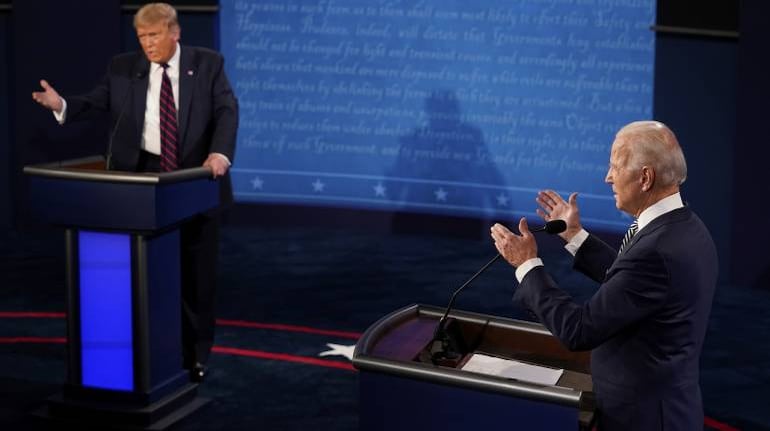



The first US presidential debate for the November 3 elections was held earlier today (0630 IST), between incumbent Donald Trump and Democratic rival Joe Biden. It was the most chaotic of such debates that I have watched closely since the 2008 cycle.
This was perhaps to be expected given Trump’s provocative style, and it was marked by his repeated interruptions of his opponent, for which he was called out by the moderator on several occasions. Biden did not have any particular ‘high’ moment, but he held his ground contrary to Trump campaign projections of a disoriented and aged person.
The takeaways for commentators and analysts, till the next debate scheduled for October 15, were Trump’s refusal to criticise ‘white supremacist’ groups and actually naming one and asking them to “stand back, stand by”, and predicting election fraud in mail-in ballots and a contested election result and no clear decision for “days, weeks, months” after the election.
There were also some unseemly personal attacks. Trump wanted to rope in references to Biden’s son who had remunerative arrangements from companies in Ukraine, Russia and China. Biden did not attack any member of the President’s family, but slipped in comments about Trump being “racist”, “Putin’s puppy”, a “clown”, “doesn’t know what he is talking about”, “doesn’t have a plan”, and that “he was the worst President America has ever had”.
Reflecting the issues current in US politics, the debate focused on nomination of next Supreme Court Justice, response to COVID-19, economy, Trump’s federal income tax payment, race and violence, law and order, climate change, integrity of the election and Trump and Biden’s respective records in governance.
On these issues, there were no surprises, with respective positions having been already laid out during the campaign so far.
Trump stuck to his position that he had been elected for four years, not three, and was empowered to nominate the next judge for the Supreme Court, especially with a Republican controlled Senate. Biden argued that the election process and early balloting had already begun, and nomination should await the winner of the election.
On COVID-19, Trump repeated his claims that he had shut the US early enough, was mobilising for an early vaccine, and it was a problem attributable to Chinese hiding of early data. Biden criticised him for not following science, muzzling his infectious disease advisers, and giving conflicting signals on preventive measures including use of masks and social distancing.
Trump argued that the economy was doing extremely well during his watch till January, with historically low unemployment levels, and was now bouncing back after the initial shock over April-June. He also criticised Democratic governors for not opening early enough, with negative economic impact. Biden claimed credit for coordinating the successful US response to the 2008 financial crisis, and that the economy had done far better in the last three years of the Barack Obama administration than in the first three years under Trump.
He also drew attention to the recent New York Times report of Trump not having paid any income tax for years, and only $750 in 2017 when he was President, when even teachers were paying more than him. While denying this, Trump asserted that he only exploited loopholes and provisions in existing laws in which Biden was, in a way, complicit as a Congressman, Senator and Vice-President for years.
It was on race, violence, law and order that there was a play for some of the undecided voters. Biden criticised Trump for doing “dog whistles” to “white supremacists”, ending race sensitivity training for police, and emphasised the need for law and order with justice. He acknowledged that there was “systemic injustice in education, work, law enforcement and justice” in US, there was need for accountability in harsh police action, and that peaceful protests were legitimate. He called out Trump for being a “racist”, for “looking down on Irish Catholics, and people who do not have money” among others. Trump faulted him for not criticising violence in the protests, and for earlier support for tough anti-crime laws that disproportionately incarcerated African Americans.
Biden reiterated his stance of rejoining the Paris 2015 accord on Climate Change, supporting renewable energy, electric vehicles, and energy efficient technologies. Trump referred to harmful economic impacts of Climate Change-focused regulations.
Talking of his record as President, Trump spoke of rebuilding of US military through enhanced budgetary provisions, better healthcare for military veterans, and appointing an unprecedented number of federal, court of appeal, and Supreme Court justices in his three years-plus. Biden criticised him for making America “weaker, sicker, poorer, more divided and more violent”.
Trump made two unnecessary negative references to India, equating us with Russia and China in hiding COVID-19 figures and being major emitter of greenhouse gases.
The process can be expected to get bitterer in the ensuing weeks, with growing anxiety in US and elsewhere about how the post-election process plays out. This could create some uncertainties for both the US and global economy.
Arun K Singh is former Indian Ambassador to the United States. Views are personal.
Discover the latest Business News, Sensex, and Nifty updates. Obtain Personal Finance insights, tax queries, and expert opinions on Moneycontrol or download the Moneycontrol App to stay updated!
Find the best of Al News in one place, specially curated for you every weekend.
Stay on top of the latest tech trends and biggest startup news.